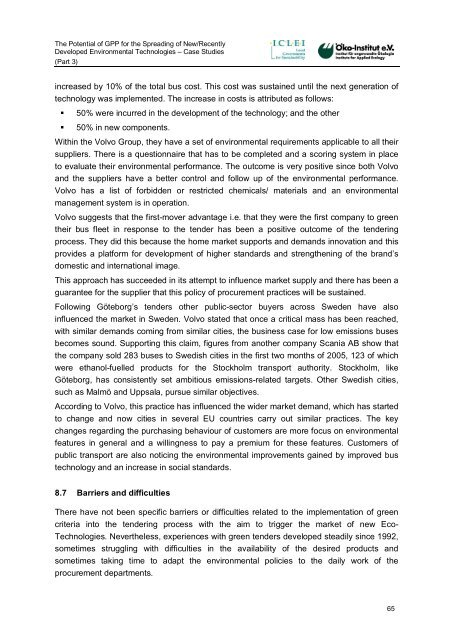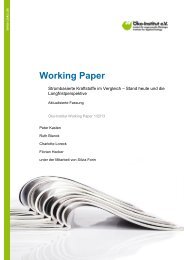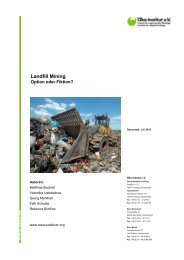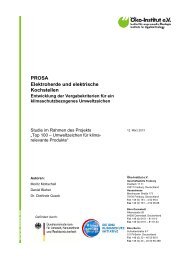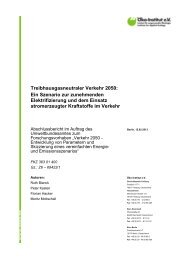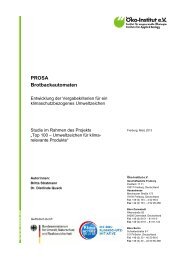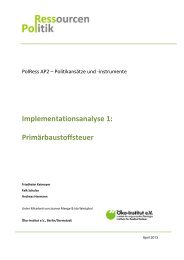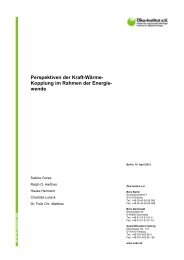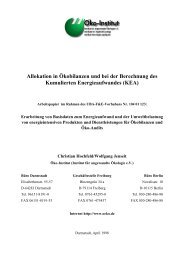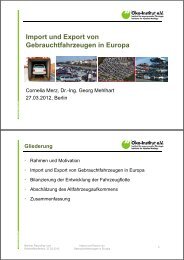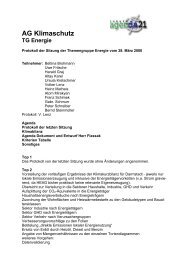- Page 1 and 2:
Authors Costs and Benefits of Green
- Page 3:
Costs and Benefits of Green Public
- Page 6 and 7:
Disclaimer Neither the European Com
- Page 8 and 9:
II Costs and Benefits of Green Publ
- Page 10 and 11:
IV Costs and Benefits of Green Publ
- Page 12 and 13:
Abbreviations ADAC Allgemeiner Deut
- Page 15 and 16:
Collection of Evidence Related to t
- Page 17 and 18:
Collection of Evidence Related to t
- Page 19 and 20:
Collection of Evidence Related to t
- Page 21 and 22:
Collection of Evidence Related to t
- Page 23 and 24:
Collection of Evidence Related to t
- Page 25 and 26:
Collection of Evidence Related to t
- Page 27 and 28:
Collection of Evidence Related to t
- Page 29 and 30:
Collection of Evidence Related to t
- Page 31 and 32:
Collection of Evidence Related to t
- Page 33 and 34:
Collection of Evidence Related to t
- Page 35 and 36:
Collection of Evidence Related to t
- Page 37 and 38:
Collection of Evidence Related to t
- Page 39 and 40:
Collection of Evidence Related to t
- Page 41 and 42:
Collection of Evidence Related to t
- Page 43 and 44:
Collection of Evidence Related to t
- Page 45 and 46:
Collection of Evidence Related to t
- Page 47 and 48:
Collection of Evidence Related to t
- Page 49 and 50:
Collection of Evidence Related to t
- Page 51 and 52:
Collection of Evidence Related to t
- Page 53 and 54:
Collection of Evidence Related to t
- Page 55 and 56:
Collection of Evidence Related to t
- Page 57 and 58:
Collection of Evidence Related to t
- Page 59 and 60:
Collection of Evidence Related to t
- Page 61 and 62:
Collection of Evidence Related to t
- Page 63 and 64:
Collection of Evidence Related to t
- Page 65 and 66:
Collection of Evidence Related to t
- Page 67 and 68:
Collection of Evidence Related to t
- Page 69 and 70:
Collection of Evidence Related to t
- Page 71 and 72:
Collection of Evidence Related to t
- Page 73 and 74:
Collection of Evidence Related to t
- Page 75 and 76:
Collection of Evidence Related to t
- Page 77 and 78:
Collection of Evidence Related to t
- Page 79 and 80:
Collection of Evidence Related to t
- Page 81 and 82:
Collection of Evidence Related to t
- Page 83 and 84:
Collection of Evidence Related to t
- Page 85 and 86:
Collection of Evidence Related to t
- Page 87 and 88:
Collection of Evidence Related to t
- Page 89 and 90:
Collection of Evidence Related to t
- Page 91 and 92:
Collection of Evidence Related to t
- Page 93 and 94:
Collection of Evidence Related to t
- Page 95 and 96:
Collection of Evidence Related to t
- Page 97 and 98:
Collection of Evidence Related to t
- Page 99 and 100:
Collection of Evidence Related to t
- Page 101 and 102:
Collection of Evidence Related to t
- Page 103 and 104:
Collection of Evidence Related to t
- Page 105 and 106:
Collection of Evidence Related to t
- Page 107 and 108:
Collection of Evidence Related to t
- Page 109 and 110:
Collection of Evidence Related to t
- Page 111 and 112:
Collection of Evidence Related to t
- Page 113 and 114:
Collection of Evidence Related to t
- Page 115 and 116:
Collection of Evidence Related to t
- Page 117 and 118:
Collection of Evidence Related to t
- Page 119 and 120:
Collection of Evidence Related to t
- Page 121 and 122:
Collection of Evidence Related to t
- Page 123 and 124:
Collection of Evidence Related to t
- Page 125 and 126:
Collection of Evidence Related to t
- Page 127 and 128:
Collection of Evidence Related to t
- Page 129 and 130:
Collection of Evidence Related to t
- Page 131 and 132:
Collection of Evidence Related to t
- Page 133 and 134:
Collection of Evidence Related to t
- Page 135 and 136:
Collection of Evidence Related to t
- Page 137 and 138:
Collection of Evidence Related to t
- Page 139 and 140:
Collection of Evidence Related to t
- Page 141 and 142:
Collection of Evidence Related to t
- Page 143 and 144:
Collection of Evidence Related to t
- Page 145 and 146:
Collection of Evidence Related to t
- Page 147 and 148:
Collection of Evidence Related to t
- Page 149 and 150:
Collection of Evidence Related to t
- Page 151 and 152:
Collection of Evidence Related to t
- Page 153 and 154:
Collection of Evidence Related to t
- Page 155 and 156:
Collection of Evidence Related to t
- Page 157 and 158:
Collection of Evidence Related to t
- Page 159 and 160:
Collection of Evidence Related to t
- Page 161 and 162:
Collection of Evidence Related to t
- Page 163 and 164:
Collection of Evidence Related to t
- Page 165 and 166:
Collection of Evidence Related to t
- Page 167 and 168:
Collection of Evidence Related to t
- Page 169 and 170:
Collection of Evidence Related to t
- Page 171 and 172:
Collection of Evidence Related to t
- Page 173 and 174:
Collection of Evidence Related to t
- Page 175 and 176:
Collection of Evidence Related to t
- Page 177 and 178:
Collection of Evidence Related to t
- Page 179 and 180:
Collection of Evidence Related to t
- Page 181 and 182:
Collection of Evidence Related to t
- Page 183 and 184:
Collection of Evidence Related to t
- Page 185 and 186:
Collection of Evidence Related to t
- Page 187 and 188:
Collection of Evidence Related to t
- Page 189 and 190:
Collection of Evidence Related to t
- Page 191 and 192:
Collection of Evidence Related to t
- Page 193 and 194:
Collection of Evidence Related to t
- Page 195 and 196:
Collection of Evidence Related to t
- Page 197 and 198:
Collection of Evidence Related to t
- Page 199 and 200:
Collection of Evidence Related to t
- Page 201 and 202:
Collection of Evidence Related to t
- Page 203 and 204:
Collection of Evidence Related to t
- Page 205 and 206:
Collection of Evidence Related to t
- Page 207 and 208:
Collection of Evidence Related to t
- Page 209 and 210:
Collection of Evidence Related to t
- Page 211 and 212:
Collection of Evidence Related to t
- Page 213 and 214:
Collection of Evidence Related to t
- Page 215 and 216:
Collection of Evidence Related to t
- Page 217 and 218:
Collection of Evidence Related to t
- Page 219 and 220:
Collection of Evidence Related to t
- Page 221 and 222:
Collection of Evidence Related to t
- Page 223 and 224:
Collection of Evidence Related to t
- Page 225 and 226:
Collection of Evidence Related to t
- Page 227 and 228:
Collection of Evidence Related to t
- Page 229 and 230:
Collection of Evidence Related to t
- Page 231 and 232:
Collection of Evidence Related to t
- Page 233 and 234:
Collection of Evidence Related to t
- Page 235 and 236:
Collection of Evidence Related to t
- Page 237 and 238:
Collection of Evidence Related to t
- Page 239 and 240:
Collection of Evidence Related to t
- Page 241 and 242:
Collection of Evidence Related to t
- Page 243 and 244:
Collection of Evidence Related to t
- Page 245 and 246:
Collection of Evidence Related to t
- Page 249 and 250:
Costs and Benefits of Green Public
- Page 251 and 252:
Additional Costs for Individual Pur
- Page 253:
Additional Costs for Individual Pur
- Page 256 and 257:
These criteria include: · Relevanc
- Page 258 and 259:
Table 2 Local/ regional authorities
- Page 260 and 261:
6 Costs and Benefits of Green Publi
- Page 262 and 263:
5 Results This section shows: · Th
- Page 264 and 265:
5.3 Total additional costs of GPP 1
- Page 266 and 267:
12 Costs and Benefits of Green Publ
- Page 268 and 269:
5.4.2 Arpa Piemonte: Costs for GPP
- Page 270 and 271:
5.4.4 Budapest: Costs for GPP polic
- Page 272 and 273:
18 Costs and Benefits of Green Publ
- Page 274 and 275:
5.5.3 Ravensburg: Costs for impleme
- Page 276 and 277:
22 Costs and Benefits of Green Publ
- Page 278 and 279:
Table 8 Costs for training for GPP
- Page 280 and 281:
Bromley Budapest 26 Office of Gover
- Page 282 and 283:
Örebro Ravensburg The Basque Envir
- Page 284 and 285:
30 Costs and Benefits of Green Publ
- Page 286 and 287:
10 Annex Analysing the costs 32 Cos
- Page 288 and 289:
B. Administrative costs for establi
- Page 290 and 291:
GPP Training and events 36 Costs an
- Page 292 and 293:
38 Costs and Benefits of Green Publ
- Page 295 and 296:
Costs and Benefits of Green Public
- Page 297 and 298:
The Potential of GPP for the Spread
- Page 299 and 300:
The Potential of GPP for the Spread
- Page 301 and 302:
The Potential of GPP for the Spread
- Page 303 and 304:
The Potential of GPP for the Spread
- Page 305 and 306:
The Potential of GPP for the Spread
- Page 307 and 308:
The Potential of GPP for the Spread
- Page 309 and 310:
The Potential of GPP for the Spread
- Page 311 and 312:
The Potential of GPP for the Spread
- Page 313 and 314:
The Potential of GPP for the Spread
- Page 315 and 316: The Potential of GPP for the Spread
- Page 317 and 318: The Potential of GPP for the Spread
- Page 319 and 320: The Potential of GPP for the Spread
- Page 321 and 322: The Potential of GPP for the Spread
- Page 323 and 324: The Potential of GPP for the Spread
- Page 325 and 326: The Potential of GPP for the Spread
- Page 327 and 328: The Potential of GPP for the Spread
- Page 329 and 330: The Potential of GPP for the Spread
- Page 331 and 332: The Potential of GPP for the Spread
- Page 333 and 334: The Potential of GPP for the Spread
- Page 335 and 336: The Potential of GPP for the Spread
- Page 337 and 338: The Potential of GPP for the Spread
- Page 339 and 340: The Potential of GPP for the Spread
- Page 341 and 342: The Potential of GPP for the Spread
- Page 343 and 344: The Potential of GPP for the Spread
- Page 345 and 346: The Potential of GPP for the Spread
- Page 347 and 348: The Potential of GPP for the Spread
- Page 349 and 350: The Potential of GPP for the Spread
- Page 351 and 352: The Potential of GPP for the Spread
- Page 353 and 354: The Potential of GPP for the Spread
- Page 355 and 356: The Potential of GPP for the Spread
- Page 357 and 358: The Potential of GPP for the Spread
- Page 359 and 360: The Potential of GPP for the Spread
- Page 361 and 362: The Potential of GPP for the Spread
- Page 363 and 364: The Potential of GPP for the Spread
- Page 365: The Potential of GPP for the Spread
- Page 369 and 370: The Potential of GPP for the Spread
- Page 371 and 372: The Potential of GPP for the Spread
- Page 373 and 374: The Potential of GPP for the Spread
- Page 375 and 376: The Potential of GPP for the Spread
- Page 377 and 378: The Potential of GPP for the Spread
- Page 379 and 380: The Potential of GPP for the Spread
- Page 381 and 382: The Potential of GPP for the Spread
- Page 383 and 384: The Potential of GPP for the Spread
- Page 385 and 386: The Potential of GPP for the Spread
- Page 387 and 388: The Potential of GPP for the Spread
- Page 389 and 390: The Potential of GPP for the Spread
- Page 391 and 392: The Potential of GPP for the Spread
- Page 393 and 394: The Potential of GPP for the Spread
- Page 395 and 396: The Potential of GPP for the Spread
- Page 397 and 398: The Potential of GPP for the Spread
- Page 399 and 400: The Potential of GPP for the Spread
- Page 401 and 402: The Potential of GPP for the Spread
- Page 403 and 404: The Potential of GPP for the Spread
- Page 405 and 406: The Potential of GPP for the Spread
- Page 407 and 408: The Potential of GPP for the Spread
- Page 409 and 410: The Potential of GPP for the Spread
- Page 411 and 412: The Potential of GPP for the Spread
- Page 413 and 414: The Potential of GPP for the Spread
- Page 415 and 416: The Potential of GPP for the Spread
- Page 417 and 418:
The Potential of GPP for the Spread
- Page 419 and 420:
The Potential of GPP for the Spread
- Page 421 and 422:
Costs and Benefits of Green Public
- Page 423 and 424:
Costs and Benefits of Green Public
- Page 427 and 428:
Authors Costs and Benefits of Green
- Page 429 and 430:
General Recommendations Overall con
- Page 431 and 432:
General Recommendations Creating de
- Page 433:
General Recommendations input on th


